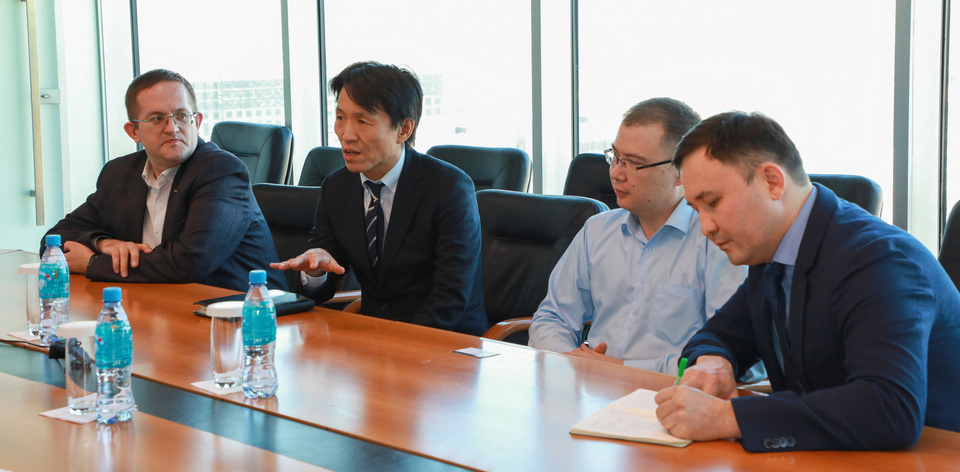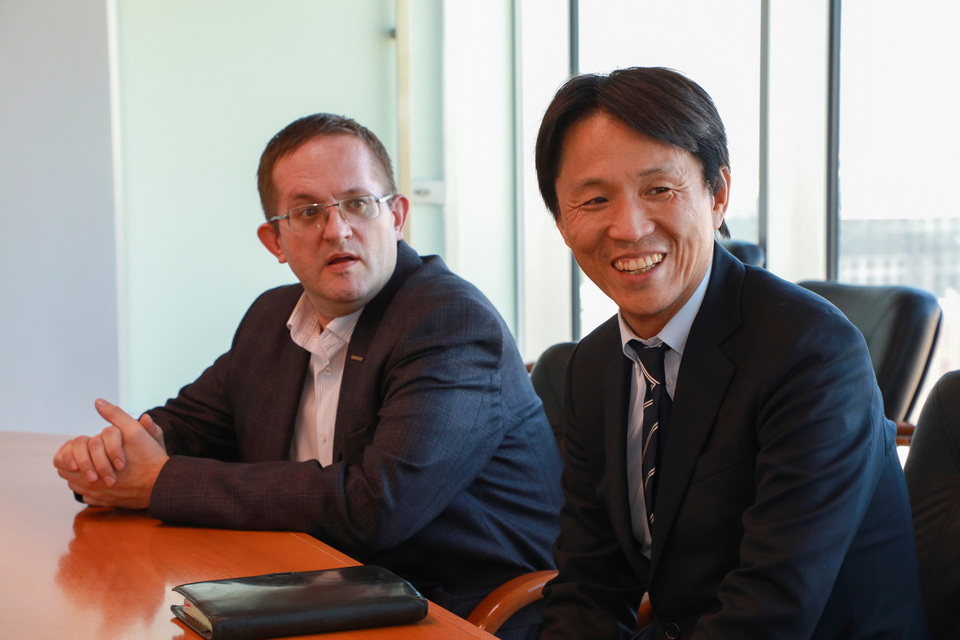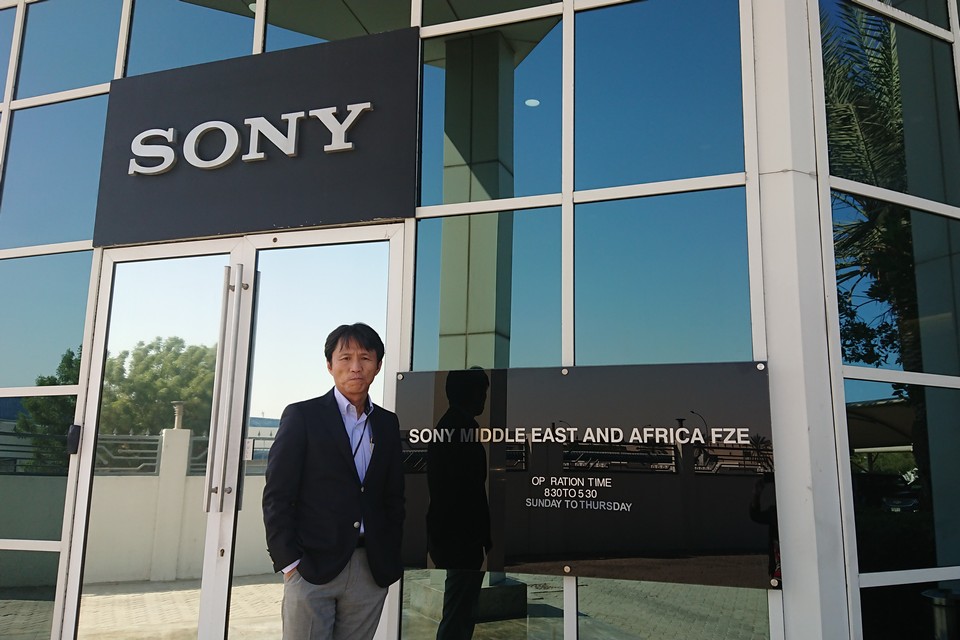 Interview with Koichi Murakami, Deputy Director, Professional Solutions Group, Sony Middle East and Africa FZE.
Interview with Koichi Murakami, Deputy Director, Professional Solutions Group, Sony Middle East and Africa FZE.
– Let’s talk about your background. Where were you born, and what were your parents’ occupations?
I was born in Japan in 1967. Both my parents are Japanese. My father is from Kyoto, and my mother is from Hiroshima. I consider myself a pure Japanese.
– Your mother must have experienced the war since she lived in Hiroshima.
Yes, she was living in the mountainous area, so she wasn’t directly affected by the war.
– What was your father’s occupation?
My father worked for a Trading company, while I joined Sony after graduating from university.
– Did you have any siblings?
Yes, I have two younger sisters.
– Which part of Japan did you live in?
I lived in Tokyo.
– What was your favorite subject in elementary school?
I loved learning languages, especially English, as I didn’t leave Japan until my university days.
– What did you study in university?
I studied Economics.
– Did you participate in any sports?
I played football, and nowadays I enjoy playing golf.
– What position did you play in football?
I was a midfielder.
– It’s interesting how football positions can sometimes reflect a person’s future career. Did you have any part-time jobs while you were a student?
No, I didn’t have any part-time jobs during my student days.
– How did you land a job at Sony?
One of my seniors from university was working at Sony and invited me to join the company in 1990.

– What was your first position when you started working at Sony?
I started as a Broadcast Salesman, involved in domestic sales for the National Broadcaster (NHK). I was assigned to support NHK for their international Cooperation Project due to my language capability.
– Can you give us an overview of your career growth?
Initially, I worked as a salesperson for domestic sales at NHK. After four years, I transitioned to international marketing and then moved to Poland for over three years. Following that, I spent over three years in the UK before returning to Japan. From there, I relocated to India for our years, and later returned to Japan for worldwide marketing. I also had postings in Taiwan for five years before based in Dubai as of now.
– What do you consider your main achievement in your career?
My main achievement lies in successfully integrating cultural communication across different markets.
– Please tell us about your family and how you met your wife.
I met my wife at a friend’s party, and interestingly, he was also a friend from Sony. She used to work at Sony as well.
– What is your wife’s occupation now?
She currently works for a local university. She left Sony to focus on raising our children. We have two daughters, aged 22 and 20.
– With all the traveling you’ve done, your daughters must have been exposed to various cultures. How many languages do they speak?
They speak two languages, Chinese and English. Both of them are currently attending university. One is majoring in Economics, and the other is studying Chemistry.
– Based on your experience and knowledge, how do you envision the future of broadcast technology?
The future of national and private broadcasters will likely follow different paths. National broadcasters have a crucial role in sharing fair information, entertainment, and supporting their own culture. Their importance will continue in each country. Private broadcasters, however, will diversify their offerings. With the influence of the internet, we can expect some broadcasters to shift towards pay-on-demand services like Netflix and Amazon, while others may focus on delivering fast news and live-sharing experiences. Sony aims to support both sectors, providing solutions for live sports, entertainment, music, gaming, and news.
– How do you foresee AI impacting the broadcasting industry in the future?
It’s important to understand the specific tasks that AI can handle. While AI can automate processes such as news editing and program creation, the human touch and emotions are irreplaceable in live news and entertainment. Humans excel at expressing unique creativity and emotions. AI can support and streamline certain aspects, making human life easier and more flexible. It ultimately enhances creativity.

– Sony has been regarded as a leading technology company. However, with the emergence of American companies like Google venturing into IT technology, do you see them becoming competitors in your industry or do you think both Sony and these companies will pursue separate directions?
Sony’s mission and vision differ from those of the prominent AGFA companies. We are more focused on entertainment and the concept of “Kando,” which emphasizes sensitivity and emotions. We support activities related to emotions, not only in electronics but also in music, pictures, gaming, and even the banking sector. Our pursuits are distinct, and I believe Sony and other AGFA companies will coexist and thrive in their respective domains.
– Throughout your 30 years at Sony, what was the most challenging obstacle you faced?
As a sales and marketing professional, one of the biggest challenges for me was setting aside my own perspective and opinions in order to prioritize the needs of others. It requires active listening and questioning skills while remaining fair and unbiased.
– Are Sony’s market ideas developed internally, or do you collaborate with third-party companies?
It depends on the situation. Sony fundamentally focuses on developing ideas in-house, as it has been ingrained in our culture since the company’s founding after World War II. We strive to preserve and promote the Sony culture. However, collaboration with external partners is not uncommon when it aligns with our vision and goals.


 Interview with Koichi Murakami, Deputy Director, Professional Solutions Group, Sony Middle East and Africa FZE.
Interview with Koichi Murakami, Deputy Director, Professional Solutions Group, Sony Middle East and Africa FZE.






